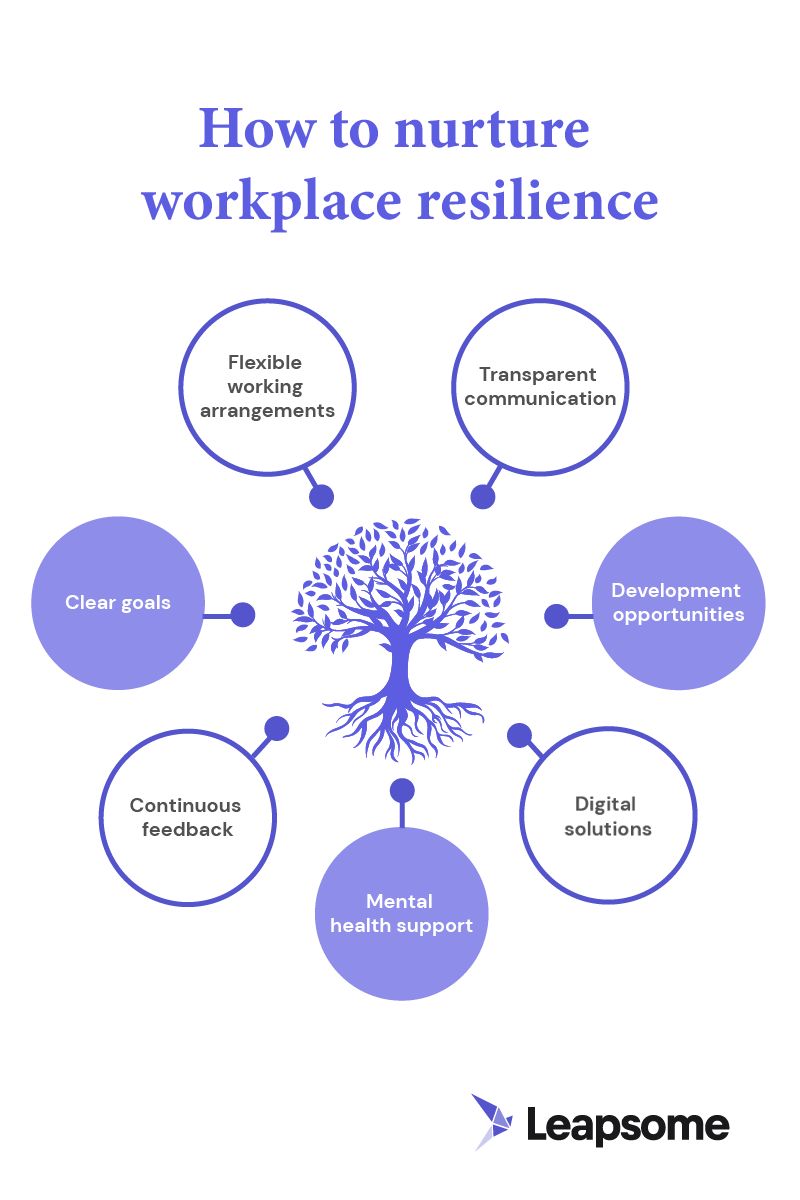Four HR experts on strategies for workplace resilience

Remote
”For companies with remote workers, the ability to navigate challenges and emerge stronger lies in fostering a remote-first work culture. Here are some strategies we have used at Remote to successfully build a resilient and engaged workforce:
- Centre your work around core values — By centering work around values such as excellence, ownership, and transparency, Remote ensures our employees feel connected and valued while simultaneously empowered to do their work well.
- Leverage async communication — Asynchronous communication and flexible hours allow our team to work at their peak productivity hours, creating a balance between work and personal life, which is critical during uncertain times.
- Support remote work — By eliminating location as a barrier to employment and defaulting to async work, Remote nurtures an environment where everyone’s ideas are heard and respected. Our publicly available employee handbook serves as a comprehensive guide on how to do this well, enabling employees to understand our expectations and feel connected to our mission.
- Protect mental well-being — We’ve also prioritized mental health and wellness, offering supportive resources to ensure our team members feel equipped to handle stress and change.
A remote-first culture that prioritizes people, promotes flexibility, and encourages open communication is what has allowed us to not only survive but thrive in the face of adversity. This resilience is not just about withstanding challenges but about using them as a catalyst for growth and improvement.
Furthermore, remaining faithful to our mission and vision has been instrumental in ensuring continuity for every member of our team, regardless of their tenure. This unwavering commitment has persevered through the ebbs and flows of our journey.”

Director of People Enablement at Remote
Workable
”It’s about rolling with the punches. Our experience of the last few years showed us that we can’t always predict what’s around the corner, so we must equip our teams with the tools and capabilities to adapt quickly. That’s resilience in a nutshell.
Communication is also crucial. When people see regular headlines about layoffs, impending recessions, and international crises, they will wonder if their company – or even their job – will be affected. Keep them as well-informed as possible – even difficult information is better than an information vacuum that feeds uncertainty and rumors.
Examples of what we do at Workable are:
- Learning & development — We have a formal L&D program with a dedicated manager to build our collective skill set.
- Annual company-wide retreats — Last year, we had an all-company retreat in the Peloponnese in Greece, and this year, we had three retreats near our three working hubs of Athens, London, and Boston.
- Mental health support — The retreats are fantastic for employee engagement, connectivity, and morale. We also have tools in our benefits package dedicated to mental health, including the Headspace app and access to counseling services.
- Flexibility in work schedules and locations — We encourage our employees to design their ideal, most productive working environment while remaining close to the office. We also include two full months of “work from anywhere” in our benefits package.
- Transparent communication — We have regular all-hands and departmental meetings to show progress toward our annual goals and each team’s contributions.
The overarching key to all this is engagement. If we equip our teams with the tools to thrive and support them as needed, they’ll be more confident and engaged. That can be powerful when navigating these turbulent times.”

CHRO at Workable
EZRA
- ”Build self-awareness — Empower managers and leaders with a supportive and structured environment to become more self-aware. In difficult or uncertain times, companies can develop this trait by encouraging and providing people with the tools to explore their thoughts, emotions, and behaviors, which can ultimately improve their overall mindset and ability to lead positively.
- Set clear goals — It’s impossible to be resilient if people aren’t confident that they can achieve a positive outcome. It’s also hard to ’measure’ resilience, so it’s important to establish clear, meaningful goals. Companies must ensure they’re working closely with their leaders, teams, and individual employees to set goals that are realistic, sensible, and achievable.
- Encourage employees to ask for help and be prepared to provide dedicated support — An often-underplayed component of resilience is the ability for people to understand their own limitations and seek constructive feedback. Especially for those in managerial or leadership roles, getting external support to equip them with the tools to navigate challenging situations successfully can be invaluable for both their professional and personal development.
EZRA is a company built on helping others recognize and unleash their full potential so when it comes to our own people, that remains paramount. During difficult times, we always try and stay true to our core company values which remind us to ’keep it simple’ and ’push positively.’ This is done by remaining transparent about the challenges we’re facing, our plan to overcome them, the role our employees will play, and how we can support them. We’ve seen first-hand how transparency and two-way communication can replace uncertainty with confidence and connectivity, and as a coaching company, we deeply understand the role these practices play in fostering both organizational and employee growth.”

COO & Co-Founder at EZRA
nilo.health
”Resilience is a vital aspect of individual and organizational well-being. At nilo.health, we prioritize employee health and resilience by encouraging good nutrition, sleep, regular exercise, and fostering human connections and self-care activities.
On a team and company level, we work actively to build resilience. Acknowledging that setbacks happen and shifting our focus to what we can control is crucial. We offer regular training sessions and resources to strengthen our open feedback culture. We foster strong relationships and a sense of community. Humor and camaraderie uplift moods and motivation levels, even in difficult times, so we give our team plenty of chances to connect. Our interdisciplinary mental health committee implements practices to boost our psychologically-safe working environment. And we practice “benefit finding” and “positive reappraisal” during or after stressful events to improve happiness, motivation, and long-term productivity.
Last but far from least, our team regularly engages with the Nilo Health platform. We all have access to multiple types of training and resources to build resilience and psychological support via 1-to-1 and group sessions with experts.
Resilience has no one-size-fits-all solution. Every individual’s needs are unique. Our approach to building and maintaining resilience has to be unique, too!”

Head of People & Culture at nilo.health
How to create a culture of resilience
From the standpoint of various HR experts, it’s clear that building a resilient workplace in turbulent times requires a multi-faceted approach covering many different aspects of the employee experience. Let’s take a more in-depth look at three of those elements.
1. Foster a flexible work culture
An effective way to enable teams to become more dynamic is by supporting a range of flexible work arrangements. Indeed, a study by the PWC found that 52% of companies became more productive after introducing remote work policies. This is likely due to the following benefits:
- Location independence — Embracing asynchronous communication and a remote or hybrid setup can help balance professional and personal life, which is especially important during uncertain times. This also supports a more inclusive workplace because people that need to work from home, perhaps due to a disability or caregiving duties, aren’t excluded.
- Flexible schedules — You don’t have to restrict your workforce to the traditional 9-to-5 working day. By hiring internationally, organizations can extend their operating hours and offer much broader contact time. Team members may also prefer the ability to arrange their work around their personal commitments and have more autonomy over their schedules, which makes this an excellent employee appreciation idea.
By supporting remote or hybrid work and eliminating geographical constraints, companies can foster an inclusive environment where many different perspectives are valued.
2. Prioritize honesty and open communication
The intelligent people working at your company will undoubtedly be aware of challenging economic circumstances (unless they live under a rock!). This means that when times are tough, it’s better to confront issues head-on and embrace transparency. In fact, employees who believe their organization is transparent report 12x greater job satisfaction than employees who don’t.
Keeping employees well-informed, even when the news is not good, helps prevent an information vacuum that could foster uncertainty and rumors. A culture that acknowledges setbacks and focuses on controllable aspects can help build trust at both individual and team levels. It can also lead to greater psychological safety, a climate in which people are comfortable being (and expressing) themselves, a crucial element that has shown to set successful teams apart. Sometimes no news is not good news; give your employees the clarity they deserve.
3. Invest in technology & digital transformation
Investing in technology enables businesses to adapt rapidly, maintain productivity, and provide a seamless employee experience service despite challenging times. The software can support fostering a flexible and connected work environment, enhancing employee collaboration, communication, and overall business agility, which are key factors for surviving and thriving amid economic uncertainties.
For example, in companies using platforms like Leapsome, 23% of HR leaders feel “very well-positioned” to face a recession — that’s over twice as much as those who don’t.
Tools that support instant feedback and praise can help your people build transparency, trust, and goodwill. Surveys can uncover your team’s specific stressors and what they need to feel engaged with their work again. In addition, the best platforms have development, performance, and reward features to help manage engagement action plans and show employees how much their work is valued.
As a result, people enablement solutions can also help with talent retention by prioritizing employee well-being and ensuring layoffs don’t prompt resignations. That’s why you should choose Leapsome to either prevent or combat high turnover during a period of instability.

💡Looking for more tips on how to build a resilient workforce? Keep yourself up to date with HR influencers and attend HR conferences to get the latest and most relevant advice for managing a downturn from your peers.
How Leapsome helps build more robust businesses
Building workplace resilience is vital for organizations to navigate uncertainties and maintain a competitive edge effectively. The best way to cope is by investing in company culture and putting your people first.
People enablement software like Leapsome is fundamental to any strategy to strengthen your organization. By prioritizing development, engagement, and performance, you can create a nurturing environment where employees are happy to work. Our platform offers competency frameworks to structure learning, surveys to uncover what motivates your teams, and reviews to support them in reaching their potential. This will raise employees’ job satisfaction and engagement with their roles and prevent them from leaving when times get tough. Protecting your employees’ well-being will help your company stay productive and thrive even in the most hostile economic conditions.
💪 Want your team to be ready for anything?
Leapsome’s all-in-one holistic people enablement solution supports employee well-being while helping them engage with their work.
👉 Book a demo
Experts predicted a recession, but the current economic slowdown has been steeper and more widespread than expected. Inflation is now the highest it’s been in decades, and businesses are experiencing the most significant drop in profits since the start of the COVID-19 pandemic. Furthermore, 50% of companies* have experienced a rise in employee turnover in the past six months.
Despite the difficult situation, many organizations are still optimistic about the future. 91% of HR leaders* say their companies are ready and well-positioned to brave the unfavorable economic conditions, indicating that it’s possible to weather the storm if you have the right strategies.
How can you reinforce workplace culture and keep positive in challenging times? Our State of People Enablement Report shows organizations that invest in their employees feel better positioned to manage turbulent times and see a 10%* increase in retention. Indeed, it’s vital to maintaining a strong and adaptable workforce.
To get better insight into the tactics deployed by successful organizations right now, we’ve spoken to four HR leaders to learn what resilience-building strategies they are using to navigate these tumultuous times.
Leapsome State of People Enablement Report, 2023
What is workplace resilience?
Workplace resilience refers to an organization’s ability to anticipate, prepare for, and withstand disruptions. Sometimes this can be through times of crisis, like the recent COVID-19 pandemic, but companies also need to adapt to more minor bumps in the road. For example, current developments in AI are leading to feelings of uncertainty in many industries, something that HR leaders are navigating.
Building a resilient workplace culture is crucial if your people will manage various upheavals relating to economic uncertainty. Potential challenges include:
- Reduced budgets — Teams may have their budgets slashed and be expected to find ways to ‘do more with less.’ Budgets for employee perks and team events might also suffer.
- Understaffing — Team members may be working at an increased capacity due to hiring freezes or layoffs.
- Lack of clear direction — Companies may face difficulty making strategic decisions with increased risk and uncertainty from an ever-shifting landscape.
All these factors have an adverse effect on company culture, decreasing job satisfaction and reducing engagement levels. Tellingly, there’s a strong correlation between employee happiness and organizational resilience — a study found that 86% of team members who agreed morale was high at their company also said they were prepared for the recession. Only 42% who described morale as ‘poor’ thought the same.
How can you build an organizational culture that can withstand economic upheaval, significant change, and shifts in the work world? We spoke to four HR leaders to learn how they foster strong and supported teams during these turbulent times.
How top HR executives are cultivating resilience in the workplace
Ready to transform
your People operations?
Automate, connect, and simplify all HR processes across the employee lifecycle.
.webp)
.webp)
 Request a demo today
Request a demo today































